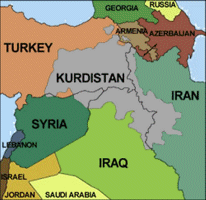Objective: The energy independence of Europe, the containment of China in Africa, and the development of African assets
Goal: Breaking the energy ties between Russia and Europe, limiting the transfer of operational assets from African nations to China, and the transformation of African assets into capital
Current fields of Operations: Western Africa and the Middle East
Venue: Mediterranean hydrocarbons
The current commentary does not seek to address all pertinent issues. Its objective is to place the conflicts in the area between Western Africa and the Middle East into the larger picture of energy, security, and economics. Here are some fundamental facts:
- The French policy seeks to advance its interests and ties to its former colonies through the revitalization if its Francafrique strategy. The assets/minerals (e.g. uranium for its nuclear industry) in that part of Africa are of vital importance not only to France but to the whole EU in general.
- Washington desires to limit the influence of China in Africa. It seems that finally Washington’s awakening has taken place, after it left the field open to the Chinese for close to 15 years. All indications are that the fastest growing continent has a lot to offer in the global quest for growth, and assets which are vital for capital and wealth formulation.
- The Pan Sahel region is crucial not only for asset and capital development but also for containing terrorist threats. As the maps below show it stretches from the Atlantic Ocean to the Red Sea, and it covers countries such as Mali, Algeria, Niger, Libya, Chad, Mauritania, Sudan, Eritrea, etc.
- The containment of the terrorist threats in the region is vital for the security of the hydrocarbons in the Mediterranean Sea (especially the area covered by Israel, Cyprus, Lebanon, and Greece). All indications from recent studies/explorations in the Mediterranean Sea show that the area is endowed with vast hydrocarbon resources. Therefore, the area as shown below needs to be protected from the possible terrorist threats.
- The political, economic, and social instability in Egypt, Libya, Tunisia, and of course Syria that has been converting the Arab Spring into winter is a major issue since it could affect the regional stability. The political process works slowly and has created turmoil and marginalization. New pockets/hubs of stability are needed that will be used as buffer zones. Lebanon could play a significant role in that direction, especially if discussions between Palestinians and Israelis are revitalized. Towards that goal of creating buffer pockets the establishment of the state of Kurdistan could prove to be vital (see map below), since it opens another route of energy resources (especially if it is extended into what nowadays is Syria) that could feed Europe and be connected to the Israeli-Cypriot and Greek pipelines that will be feeding Europe and allowing her to obtain partial energy independence from Russia.
- The US military administration in Africa (AFRICOM) will be playing an increasingly significant role in advancing security and the above objectives in the area. To a large extent AFRICOMS’s area of operations coincides with the Pan Sahel region. The area’s resources in oil, natural gas, gold, copper, diamonds, and uranium are too important to be left to luck. Ten years ago the region’s exports to China were worth about $5 billion. Last year’s exports were worth well over $110 billion.
- The financial and economic turmoil in Southern Europe – and especially the Cypriot economic situation with the unheard and absurd proposal for a haircut in Cypriot banks’ deposits – should also be viewed under the prism of assets’ development and the overall strategy of converting hydrocarbon assets and minerals into sources of capital that will advance growth in the region. Such a plan will also allow collateralization and securitization of those assets in order to allow credit and money supply extension, and in the overall scheme of things to serve the purpose of exiting from the toxic enslavement that was created in the period between 1998-2008.
It’s expected to be a pretty interesting ride!




